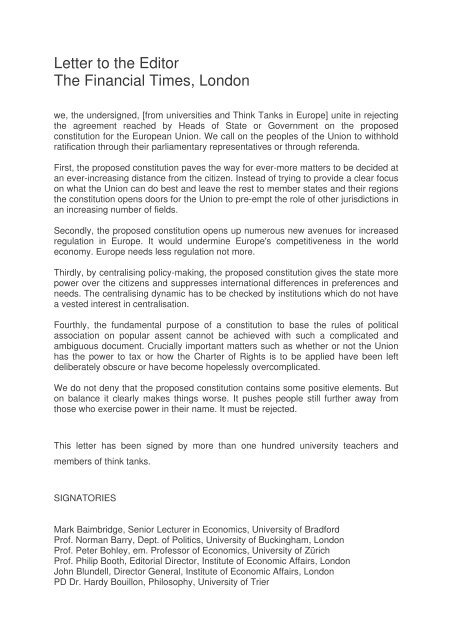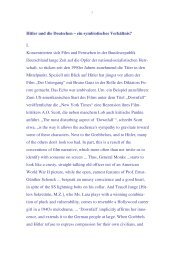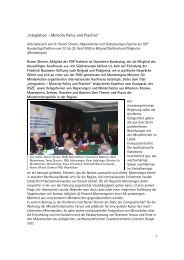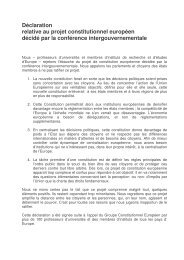Letter to the Editor The Financial Times, London
Letter to the Editor The Financial Times, London
Letter to the Editor The Financial Times, London
Create successful ePaper yourself
Turn your PDF publications into a flip-book with our unique Google optimized e-Paper software.
<strong>Letter</strong> <strong>to</strong> <strong>the</strong> Edi<strong>to</strong>r<br />
<strong>The</strong> <strong>Financial</strong> <strong>Times</strong>, <strong>London</strong><br />
we, <strong>the</strong> undersigned, [from universities and Think Tanks in Europe] unite in rejecting<br />
<strong>the</strong> agreement reached by Heads of State or Government on <strong>the</strong> proposed<br />
constitution for <strong>the</strong> European Union. We call on <strong>the</strong> peoples of <strong>the</strong> Union <strong>to</strong> withhold<br />
ratification through <strong>the</strong>ir parliamentary representatives or through referenda.<br />
First, <strong>the</strong> proposed constitution paves <strong>the</strong> way for ever-more matters <strong>to</strong> be decided at<br />
an ever-increasing distance from <strong>the</strong> citizen. Instead of trying <strong>to</strong> provide a clear focus<br />
on what <strong>the</strong> Union can do best and leave <strong>the</strong> rest <strong>to</strong> member states and <strong>the</strong>ir regions<br />
<strong>the</strong> constitution opens doors for <strong>the</strong> Union <strong>to</strong> pre-empt <strong>the</strong> role of o<strong>the</strong>r jurisdictions in<br />
an increasing number of fields.<br />
Secondly, <strong>the</strong> proposed constitution opens up numerous new avenues for increased<br />
regulation in Europe. It would undermine Europe's competitiveness in <strong>the</strong> world<br />
economy. Europe needs less regulation not more.<br />
Thirdly, by centralising policy-making, <strong>the</strong> proposed constitution gives <strong>the</strong> state more<br />
power over <strong>the</strong> citizens and suppresses international differences in preferences and<br />
needs. <strong>The</strong> centralising dynamic has <strong>to</strong> be checked by institutions which do not have<br />
a vested interest in centralisation.<br />
Fourthly, <strong>the</strong> fundamental purpose of a constitution <strong>to</strong> base <strong>the</strong> rules of political<br />
association on popular assent cannot be achieved with such a complicated and<br />
ambiguous document. Crucially important matters such as whe<strong>the</strong>r or not <strong>the</strong> Union<br />
has <strong>the</strong> power <strong>to</strong> tax or how <strong>the</strong> Charter of Rights is <strong>to</strong> be applied have been left<br />
deliberately obscure or have become hopelessly overcomplicated.<br />
We do not deny that <strong>the</strong> proposed constitution contains some positive elements. But<br />
on balance it clearly makes things worse. It pushes people still fur<strong>the</strong>r away from<br />
those who exercise power in <strong>the</strong>ir name. It must be rejected.<br />
This letter has been signed by more than one hundred university teachers and<br />
members of think tanks.<br />
SIGNATORIES<br />
Mark Baimbridge, Senior Lecturer in Economics, University of Bradford<br />
Prof. Norman Barry, Dept. of Politics, University of Buckingham, <strong>London</strong><br />
Prof. Peter Bohley, em. Professor of Economics, University of Zürich<br />
Prof. Philip Booth, Edi<strong>to</strong>rial Direc<strong>to</strong>r, Institute of Economic Affairs, <strong>London</strong><br />
John Blundell, Direc<strong>to</strong>r General, Institute of Economic Affairs, <strong>London</strong><br />
PD Dr. Hardy Bouillon, Philosophy, University of Trier
Keith Boyfield, Keith Boyfield Associates, <strong>London</strong><br />
Prof. David Conway, Senior Research Fellow, Civitas, <strong>London</strong><br />
Prof. Vic<strong>to</strong>ria Curzon-Price, Professor of Economics, University of Geneva<br />
Dr. Gert Dahlmanns, Special Advisor <strong>to</strong> <strong>the</strong> President, Zeppelin University<br />
Friedrichshafen<br />
Dr. Hugo Dicke, Institute for World Economics, Kiel<br />
Prof. Jürgen B. Donges, Professor of Economics, University of Cologne<br />
Ondrej Dostal, Direc<strong>to</strong>r, Conservative Institute of M.R. Stefanik, Bratislava<br />
Prof. Kevin Dowd, Nottingham University Business School<br />
Prof. Reinhard Eichenberger, Professor of Economics, University of<br />
Fribourg<br />
Prof. Norbert Eickhoff, Professor of Economics, University of Potsdam<br />
Prof. Gisela Färber, Professor of Economics, Deutsche Hochschule für<br />
Verwaltung, Speyer<br />
Prof. Ulrich Fehl, Professor of Economics, University of Marburg<br />
Prof. Lars Feld, Professor of Economics, University of Marburg<br />
Prof. Anthony Flew, em. Professor of Philosophy, University of Reading<br />
Prof. Cay Folkers, Professor of Economics, University of Bochum<br />
Prof. Vincente Font Pascual, IESE, University of Navarra<br />
Prof. James Foreman-Peck, Professor of Welsh Economic Research, Cardiff<br />
Business School<br />
Prof. Hans-Hermann Francke, Professor of Economics, University of Freiburg<br />
Prof. Andreas Freytag, Professor of Economics, University of Jena<br />
Prof. Clemens Fuest, Professor of Economics, University of Cologne<br />
Prof. Ot<strong>to</strong> Gandenberger, Professor of Economics, University of Munich<br />
Prof. Carlos Garcia Pont, IESE Business School, University of Navarra<br />
Prof. Nuno Garoupa, Associate Professor, New University of Lisbon<br />
Prof. Carlo Giannone, Sienza delle Finanze, University of Samnio<br />
Prof. Herbert Giersch, retired President of Institute for World Economics, Kiel<br />
Peter Gonda, Conservative Institute of M.R. Stefanik, Bratislava<br />
Dr. David G. Green, Direc<strong>to</strong>r, Civitas, <strong>London</strong><br />
Prof. Hans Peter Grüner, Professor of Economics, University of Mannheim<br />
Prof. Gerd Habermann, Economics, University of Potsdam<br />
Martin Hanus, Conservative Institute of M.R. Stefanik, Bratislava<br />
Lord Harris of High Cross, Institute of Economic Affairs, <strong>London</strong><br />
Prof. Ernst Helmstädter, em. Professor of Economics, University of Münster<br />
Prof. Klaus-Dirk Henke, Professor of Economics, Technical University Berlin<br />
Prof. Stefan Homburg, Professor of Economics, University of Hannover<br />
Prof. Helmut Karl, Professor of Economics, University of Bochum<br />
Radovan Kazda, Conservative Institute of M.R. Stefanik, Bratislava<br />
Prof. Claus D. Kernig, em. Professor of Political Science, University of Trier<br />
Prof. Henning Klodt, Institute for World Economics, Kiel<br />
Prof. Günter Knieps, Professor of Economics, University of Freiburg<br />
Dr. Oliver Knipping, President, Institute for Free Enterprise, Berlin<br />
Prof. Ulrich Koester, Professor of Agricultural Economics, University of Kiel<br />
Prof. Horst Kurth, em. Professor of Statistics and Economics, University of<br />
Kassel<br />
Prof. Hans Albin Larsson, Professor of His<strong>to</strong>ry, Jönköping University<br />
Ruth Lea, Direc<strong>to</strong>r, Centre for Policy Studies, <strong>London</strong><br />
Prof. Hans Ot<strong>to</strong> Lenel, em. Professor of Economics, University of Mainz<br />
2
Prof. Jonas Ljungberg, Assoc. Professor, Dept. of Economic His<strong>to</strong>ry,<br />
University of Lund<br />
Prof. Helga Luckenbach, em. Professor of Economics, University of Giessen<br />
Dr. Petr Mach, Executive Direc<strong>to</strong>r, Centrum pro ekonomiku u politiku, Prague<br />
Prof. Kenneth Minogue, em. Professor of Political Science, University of <strong>London</strong><br />
(L.S.E.)<br />
Prof. Dennis C. Mueller, Professor of Economics, University of Vienna<br />
Prof. Peter Oberender, Professor of Economics, University of Bayreuth<br />
Prof. Karl Meessen, Jean Monnet Professor of Law, University of Jena<br />
Prof. Patrick Minford, Professor of Economics, Cardiff Business School<br />
Prof. Hans G. Monissen, em. Professor of Economics, University of Würzburg<br />
Prof. Hans H. Nachtkamp, em. Professor of Economics, University of<br />
Mannheim<br />
Dr. Peter Osusky, vice-rec<strong>to</strong>r, Comenius University of Bratislava<br />
Lord Pearson of Rannoch, Global Britain, <strong>London</strong><br />
Prof. Gerard Radnitzky, em. Professor of Philosophy, University of Trier<br />
Prof. Ivar Raig, Audentes University Tallinn, Chair of <strong>the</strong> Board, Institute for<br />
European Studies and Research Centre Free Europe<br />
Prof. Rudolf Richter, em. Professor of Economics, University of Saarland<br />
Prof. Carlos Rodriguez Braun, University Complutense, Madrid<br />
Dalibor Rohac, Institute for a Free Society, Bratislava<br />
Prof. Juan Roure, IESE Business School, University of Navarra<br />
Prof. Hans H. Rupp, em. Professor of Law, University of Mainz<br />
Prof. Karlhans Sauernheimer, Professor of Economics, University of Munich<br />
Prof. Wolf Schäfer, Professor of Economics, Helmut-Schmidt-University<br />
Hamburg<br />
Prof. Wolfgang Scherf, Professor of Economics, University of Giessen<br />
Prof. Jürgen Schröder, Professor of Economics, University of Mannheim<br />
Prof. Alfred Schüller, Professor of Economics, University of Marburg<br />
Prof. Pedro Schwartz, Professor of Economics, Uni San Pablo-CEU, Madrid<br />
Prof. Gerhard Schwödiauer, Professor of Economics, University of<br />
Magdeburg<br />
Prof. Friedrich L. Sell, Professor of Economics, University of <strong>the</strong> Armed<br />
Forces Munich<br />
Prof. Jürgen Siebke, Professor of Economics, University of Heidelberg<br />
Dusan Sloboda, Conservative Institute of M.R. Stefanik, Bratislava<br />
Prof. Karl Socher, em. Professor of Political Economy, University of Innsbruck<br />
Prof. <strong>The</strong>odor Siegel, Professor of Business, Humboldt University Berlin<br />
Gabriel Stein, Direc<strong>to</strong>r, Lombard Street Research Ltd., <strong>London</strong><br />
Prof. Manfred E. Streit, Max Planck Institute for Research in<strong>to</strong> Economic<br />
Systems, Jena<br />
Dr. Janez Sustersic, Institute of Macroeconomic Analysis and Development,<br />
Ljubljana<br />
Sascha Tamm, Research Fellow, Liberal Institute, Friedrich Naumann<br />
Foundation, Potsdam<br />
Richard Tea<strong>the</strong>r, Senior Lecturer in Tax Law, Bournemouth University<br />
Prof. Rafael Termes, IESE Business School, University of Navarra<br />
Prof. Georg Tolkemitt, em. Professor of Economics, University of Hamburg<br />
Prof. Harald Uhlig, Professor of Ecomonics, Humboldt University Berlin<br />
3
Prof. Vic<strong>to</strong>r Vanberg, Professor of Economics, University of Freiburg<br />
Prof. Stefan Voigt, Professor of Economics, University of Kassel<br />
Prof. Casper de Vries, Professor of Economics, Erasmus University<br />
Rotterdam<br />
Prof. Christian Watrin, em. Professor of Economics, University of Cologne<br />
Prof. Rolf Weder, Dept. of Economics and Europe Institute, University of<br />
Basel<br />
Prof. Erich Weede, Professor of Sociology, University of Bonn<br />
Dr. Horst Werner, Liberal Institute, Potsdam<br />
Prof. Franz-Ulrich Willeke, em. Professor of Economics, University of<br />
Heidelberg<br />
Prof. Hans Willgerodt, em. Professor of Economics, University of Cologne<br />
Prof. Artur Woll, em. Professor of Economics, University of Siegen<br />
Prof. Peter Zajac, Conservative Institute of M.R. Stefanik, Bratislava<br />
Prof. Michael Zöller, Professor of Sociology, University of Bayreuth<br />
Prof. Peter Zweifel, Professor of Economics, University of Zürich<br />
<strong>The</strong>se signatures have been invited by <strong>the</strong> European Constitutional Group:<br />
Prof. Peter Bernholz, em. Professor of Economics, Centre of Economics &<br />
Business (WWZ), University of Basel<br />
Prof. Charles B. Blankart, Professor of Economics, Humboldt University Berlin<br />
Prof. Francisco Cabrillo, Chairman, Dept. of Applied Economics IV, University<br />
Complutense, Madrid<br />
Prof. Jean-Pierre Centi, Centre d'Analyse Economique, Aix-en-Provence<br />
Dr. Detmar Doering, Direc<strong>to</strong>r, Liberal Institute, Friedrich Naumann Foundation,<br />
Potsdam<br />
Dr. habil. Lüder Gerken, Direc<strong>to</strong>r, Hayek Foundation, Freiburg<br />
Prof. Christian Kirchner, Professor of Law, Humboldt University<br />
Berlin<br />
Dr. Elena Leontjeva, Founder and Chair of Board, Lithuanian Free Market<br />
Institute, Vilnius<br />
Prof. Angelo M. Petroni, Professor of Philosophy, University of Bologna<br />
Prof. Joachim Rückert, Professor of Law, University of Frankfurt<br />
Prof. Pascal Salin, University of Paris 9 Dauphine<br />
Prof. Friedrich Schneider, Professor of Economics, Johannes Kepler University<br />
Linz<br />
Dr. Jiri Schwarz, President, Liberal Institute, Prague<br />
Peter Stein, CEO, Stein Bro<strong>the</strong>rs AB, S<strong>to</strong>ckholm<br />
Prof. Roland Vaubel, Professor of Economics, University of Mannheim<br />
Frank Vibert, Direc<strong>to</strong>r, European Policy Forum, <strong>London</strong><br />
Prof. Jan Winiecki, President of Polish Society of Economists (TEP)<br />
4






